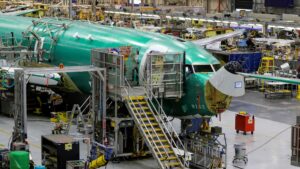The Impacts of Tariffs on the Aerospace Industry: A Deep Dive
As global dynamics shift, the aerospace industry—home to giants like Boeing and Airbus—finds itself at the crossroads of innovation and economic policy. Recent sweeping tariffs introduced by former President Donald Trump have sent shockwaves through the sector, raising crucial questions about costs associated with manufacturing, trade, and the overall health of the market. Here at Extreme Investor Network, we aim to break down these complexities and offer insights that matter to investors and industry watchers alike.
Rising Costs and Industry Implications
The introduction of a 10% tariff on various goods, including airplanes and engines, has serious ramifications for manufacturers and consumers alike. Experts, including Dak Hardwick, VP of International Affairs at the Aerospace Industries Association (AIA), assert that these tariffs are likely to escalate costs across the board. Hardwick noted, "It certainly makes things more expensive for the industry," highlighting a potential long-term shift in pricing structures that could impact air travel for years to come.
The aerospace industry plays a significant role in mitigating the U.S. trade deficit, contributing over $100 billion annually. With many airplanes and their parts traded without tariffs under a nearly 50-year-old trade agreement, any disruption in this framework poses substantial risks not just to manufacturers but also to the fragile economy that depends on them.
Navigating Regulatory Waters
Given that the AIA is advocating for the preservation of duty-free provisions, the stakes are high in Washington. However, the line of requests to the White House is long, and time will tell if any changes will materialize. During this uncertainty, we recommend that investors keep a close eye on regulatory developments which could dramatically alter the competitive landscape. Our team at Extreme Investor Network is committed to providing timely updates and detailed analyses on these issues as they unfold.
Innovation vs. Tariffs: The Defense Sector Viewpoint
The tariffs don’t just affect commercial airlines; they have broader implications for the defense production sector. The administration’s rationale—as articulated in Trump’s executive order—centers on sustaining U.S. security and defense manufacturing without heavy reliance on foreign imports. The focus here is on building a resilient manufacturing ecosystem capable of supporting national security needs.
Boeing’s CEO, Kelly Ortberg, echoed the importance of free trade, indicating how crucial international markets are for creating American jobs. As investors, understanding these intricacies can help you gauge not just the immediate market reaction but also the long-term viability of companies heavily tied to U.S. trade policies.
The Fragile Supply Chain Landscape
The pandemic has revealed vulnerabilities within the aerospace supply chain, and the introduction of tariffs only exacerbates these issues. Airlines are still grappling with parts shortages, and the rapid bounce-back in demand from COVID-19 has put further strain on an already fragile system. Importantly, the designation of "Made in the USA" is often misleading; components are sourced globally, making the cost implications of tariffs widespread.
As major aviation companies, such as Airbus and Boeing, aim to ramp up production to meet demand, supply chain delays might stretch costs and timelines even further. This calls for vigilance from investors, as companies that fail to adapt may face diminishing market share.
Final Thoughts: Where Do We Go From Here?
As the aerospace industry navigates the complexities introduced by tariffs, knowing the implications is vital. Investors should remain informed and proactive, monitoring how companies adapt and respond to these engulfing pressures. Air travel is unlikely to cease—demand for planes and their parts will persist—but the cost to consumers may climb as these new economic policies take hold.
The team at Extreme Investor Network is dedicated to offering comprehensive insights and helping investors understand the broader impact of tariffs on the aerospace and defense industry. Keep following us for the latest updates and analyses that empower your investment strategies in an ever-changing market.

